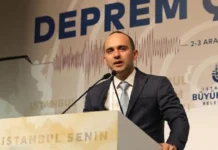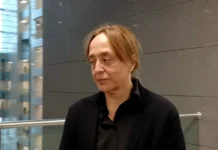The Council of Judges and Prosecutors (HSK), Turkey’s top judicial board, has launched an investigation into Judge Fatih Kapan over his order to release a Turkish celebrity manager accused of involvement in organizing the 2013 Gezi Park protests, Turkish Minute reported.
Ayşe Barım, a well-known figure in Turkey’s entertainment industry and the founder of ID Communications, was detained on January 24 and later arrested on charges of “attempting to overthrow the government.” Authorities accuse her of encouraging actors under her management to participate in the protests, which began as a demonstration against an urban development project in İstanbul’s Gezi Park but quickly escalated into a nationwide anti-government movement.
Barım’s lawyer appealed her pretrial detention to the İstanbul 8th Criminal Court of First Instance, where Judge Kapan ordered her release. Judge Kapan said the nature of the alleged crime, witness statements supporting the suspect, phone records and all available evidence indicated the possibility of a change in charges and that continued detention would be “disproportionate” under such circumstances.
However, the İstanbul Chief Public Prosecutor’s Office objected to the decision, and the case was sent to a higher court, which sided with the prosecutors and overturned the release order, leading to Barım’s re-arrest before she could leave prison.
According to Anadolu, the HSK’s first chamber launched an inquiry into Kapan. The chamber ruled that the allegations against him, along with any other issues that may emerge during the inquiry, should be examined by a council inspector. The chamber recommended proceeding with a formal investigation if sufficient evidence is found.
The investigation into Barım came more than a decade after the Gezi Park protests, during which thousands of people took to the streets to oppose the government of then-prime minister and current President Recep Tayyip Erdoğan. Authorities have repeatedly revisited the demonstrations in legal proceedings, targeting activists, opposition figures and businesspeople.
Barım’s case has sparked widespread criticism, with opposition politicians and human rights advocates arguing that it reflects a broader crackdown on dissent and government control over the entertainment sector.
Observers see Barım’s arrest as part of a broader effort by Erdoğan’s ruling Justice and Development Party (AKP) to control Turkey’s cultural landscape. The government has frequently clashed with artists, writers, and filmmakers over content critical of its policies, with Erdoğan previously expressing frustration that his party has not achieved dominance in Turkey’s cultural sphere despite more than two decades in power.
Since a failed coup attempt in 2016, Turkish authorities have intensified crackdowns on opposition figures, journalists and civil society leaders. The judiciary has been accused of being used as a political tool to silence dissent, particularly in cases linked to past protests.
The Venice Commission, the Council of Europe’s advisory body on constitutional matters, expressed serious concerns regarding the composition and functioning of Turkey’s HSK, a body responsible for judicial appointments, promotions and disciplinary measures, in a report in December.
The commission found that the president, as head of the executive, directly appoints six of the 13 members of the HSK. A further three or four members are selected by the Turkish parliament, where the ruling party has considerable influence. It stated that the president and parliament’s powers to appoint nearly all members of the HSK “give the executive complete control over the body that is supposed to guarantee the independence of the judiciary.”
Under Turkey’s presidential system, the president is both chief executive and head of state and is actively involved in party politics.















